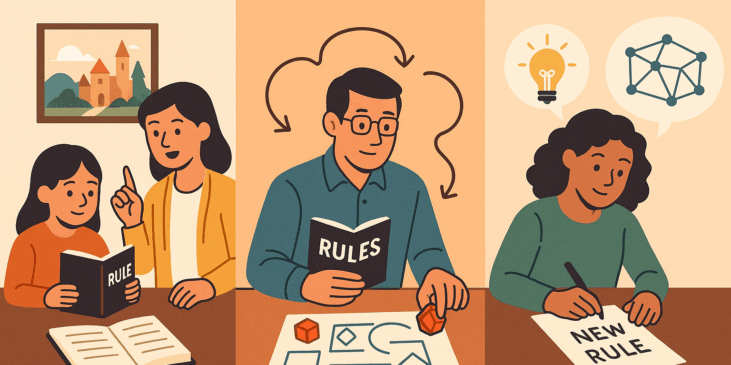By Cristo Leon.
Last updated November 11, 2025.
Role-playing games offer a unique laboratory for observing how people learn. When players skip rules, misunderstand instructions, or rely on micro-tutorials to proceed, the problem is not intelligence. It is a mismatch between the learning model assumed by the game and the learning model the players actually need.
Educational theory distinguishes between pedagogy (teacher-directed), andragogy (adult-oriented, guided), and heutagogy (self-determined) (Frey, 2018). RPGs expose the strengths and limitations of each approach. Because RPGs require reading, interpreting, negotiating, and co-creating meaning, they quickly break down when the learning conditions do not match the design assumptions (Chalk, 2022).
Understanding these distinctions helps us design game-based learning that is equitable, accessible, and cognitively rich without overwhelming the learner.
1. RPG-Based Pedagogy: Structure First, Autonomy Later
Pedagogy assumes learners need high structure and explicit direction. In RPG terms, this is similar to a «tutorial level».
Key principles
- Provide highly guided steps; do not assume prior experience.
- Break reading into small, sequential pieces tied to immediate action.
- Use repetition and clear rewards to reinforce basic mechanics.
- Keep the narrative simple so cognitive resources focus on mastery.
- Allow only limited choices until the player demonstrates stability.
Example
A classroom uses an RPG nano-scenario (o mini-scenario) to teach teamwork. Students receive a one-page rule sheet and follow a scripted encounter where each rule is introduced exactly when needed. The instructor narrates, models a move, and players repeat. This lowers cognitive load and ensures all students gain baseline competence before branching into complex play.
Sources that you can use:
- Honey Heist (Carter, 2021)
- Leyenda RPG (Cabobianco & Van Houtte, 2023)
- Transformative Role-playing Game Design (Bowman et al., 2025)
Pedagogy is effective when learners need orientation, confidence, and consistency.
2. RPG-Based Andragogy: Scaffolding Toward Autonomy
Andragogy assumes adult learners benefit from structure paired with relevance. Adults skip text when they do not perceive utility; they engage deeply when rules matter for their goals.
Key principles
- Provide a minimum viable rule set to reduce overload.
- Embed reading inside meaningful action.
- Use scaffolding that fades over time.
- Frame failure as feedback for reflection.
- Point out real-world transfer (leadership, uncertainty, negotiation).
Example
During a playtest of a conflict-negotiation RPG, adults receive a short rule primer and immediately play a small challenge. When they skip a mechanic and the scene collapses, the facilitator leads a structured debrief that asks: What assumption did you make? What did you miss? How does this mirror real workplace communication?
Sources that you can use:
- CONsensus: The GM-less TTRPG (Roda, 2025)
- Microscope (Robbins, 2011)
- Misterio (Cabobianco, 2023)
- Starter Set: Heroes of The Borderlands (Arman et al., 2025)
Andragogy increases relevance and deepens reflective learning.
3. RPG-Based Heutagogy: Self-Determined Learning Through Play
Heutagogy emphasizes learner agency, adaptability, and co-creation. RPGs are naturally heutagogical because players shape narrative, rules, and outcomes.
Key principles
- Shift from rules delivery to rules discovery.
- Encourage players to co-design subsystems or interpret mechanics.
- Integrate meta-reflection into each play loop.
- Treat collapse as an opportunity for redesign.
- Support networked knowledge: players bring external expertise into play.
Example
A design-studio class tasks students with hacking an RPG to model systems thinking. Groups redesign the conflict rules using their disciplinary backgrounds (engineering, art, film analysis, etc.). After each session, they write a reflective note on how they learned, why they changed the mechanic, and how the redesigned rule changed the game’s social dynamics.
Sources that you can use:
- Call of Cthulhu Keeper’s Rulebook: Horror Roleplaying in the Worlds of H.P. Lovecraft (Petersen et al., 2016)
- Dungeons & Dragons 2024 Player’s Handbook (D&D Core Rulebook) (Crawford et al., 2024)
- Pathfinder Core Rulebook, Second Edition (Bulmahn et al., 2019)
Heutagogy cultivates autonomy, self-assessment, and transdisciplinary thinking.
Why RPGs Make These Differences Visible
RPGs collapse quickly if learners do not read, process, or communicate effectively. This fragility is not a failure. It is a diagnostic tool. When a system breaks, we see which learning model the players needed but did not receive.
By shifting from a one-size-fits-all approach to a layered model that distinguishes pedagogy, andragogy, and heutagogy, educators and designers can build experiences that are both challenging and accessible. The goal is not to make learning easier, but to make it coherent, intentional, and supportive of cognitive growth.
If you want, I can prepare a visual diagram comparing the three models, or adapt this text for Instagram using your hummingbird branding.
Sources
Arman, J. R., Crawford, J., Lundeen, R., Perkins, C., Renie, P., & Gygax, G. (2025). Starter Set: Heroes of The Borderlands, DnD 5.5. Dungeons & Dragons, Wizards of the Coast. https://www.dndbeyond.com/sources/dnd/hotb
Bowman, S. L., Diakolambrianou, E., Brind, S., Bandhoesingh, A., Hugaas, K. H., Giovannucci, A., Tilborg, G. Q. van, Baird, J., Westborg, J., & Suominen, T. (2025). Transformative Role-playing Game Design. In Scholarly books from Uppsala University Publications. Scholarly books from Uppsala University Publications. https://doi.org/10.33063/23xd2197
Bulmahn, J., Bonner, L., Radney-MacFarland, S., & Seifter, M. (2019). Pathfinder Core Rulebook, Second Edition (Illustrated 2nd edition). Paizo Inc.
Cabobianco, M. O. (with Van Houtte, M., Leonetti, P., Arias, C., Luján, L., León, C., & Pereyra, J.). (2023). Misterio: Un Suplemento de Leyenda [Primera Edición, Impreso] (J. Serret, Ed.; CLDM_LDO [CDD 793.4]; 1.a ed.). Mito Editorial; /Research/Cultural and Social Studies [1. Narrativa Fantástica.].
Cabobianco, M. O., & Van Houtte, M. (with Leonetti, P., von Eckenbrecher, E., & Luján, L.). (2023). Leyenda, Primera Edición: Juego de Rol (Libro digital) (J. Serret, Ed.; 1ra Edición Mejorada). Mito Editorial. https://www.mitoeditorial.com/?product=leyenda-juego-de-rol
Carter, C. (2021, July 20). Honey Heist and the legacy of the one-page RPG. Polygon. https://www.polygon.com/tabletop-games/22585254/honey-heist-grant-howitt-one-page-rpg
Chalk, A. (2022). Mapping an online production network: The field of ‘actual play’ media. Convergence: The International Journal of Research into New Media Technologies, 1–18. https://doi.org/10.1177/13548565221103987
Crawford, J., De Armas, M., Petrisor, B., Perkins, C., Schneider, F. W., Winninger, R., & Wyatt, J. (2024). Dungeons & Dragons 2024 Player’s Handbook (D&D Core Rulebook) (J. Carter, J. Bauer, & A. Ng, Eds.; 5.5). Wizards of the Coast. https://www.dndbeyond.com/sources/dnd/phb-2024
Frey, B. B. (2018). The SAGE Encyclopedia of Educational Research, Measurement, and Evaluation, First Edition (1st ed.). SAGE Publications, Inc. https://doi.org/10.4135/9781506326139
Petersen, S., Mason, M., Fricker, P., & Willis, L. (2016). Call of Cthulhu Keeper’s Rulebook: Horror Roleplaying in the Worlds of H.P. Lovecraft (Call of Cthulhu RPG) (7th Edition). Chaosium Inc.
Robbins, B. (2011). Microscope (1st ed.). Lame Mage Productions.
Roda, A. (2025). CONsensus: The GM-less TTRPG (v3 ed.). https://antonioroda.itch.io/consensus-a-gmless-ttrpg

